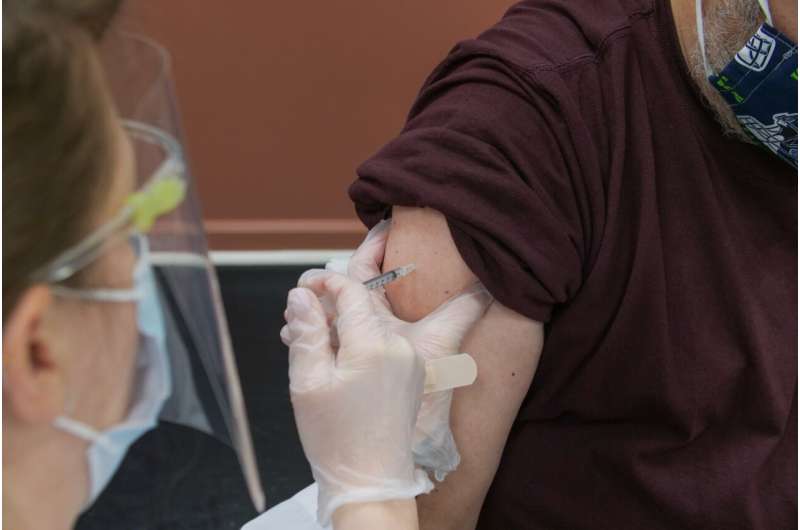This article has been reviewed according to Science X's editorial process and policies. Editors have highlighted the following attributes while ensuring the content's credibility:
fact-checked
peer-reviewed publication
trusted source
proofread
Repeated vaccine doses protect elderly against COVID-19, Swedish study shows

More and more frequent vaccine doses than in other countries reduce mortality in COVID-19 in nursing homes. This is shown by a Swedish study, led by Anders Johansson and Mattias Forsell, Umeå University, which was published in The Lancet Infectious Diseases.
In the fight against COVID-19, researchers have carefully studied the effectiveness of top-up doses of mRNA vaccine, i.e. doses four to six for people in special nursing homes.
"Our study shows that they played a decisive role in protecting seniors, also against new virus variants," says Anders Johansson, professor of infectious diseases.
People older than 80 years often show a weaker antibody response after the first doses of the vaccine.
"That is why the Public Health Agency recommends booster doses every six months—a shorter interval compared to most other countries," says Anders Johansson.
Tracking immunity in nursing homes
To understand the effect of these booster doses, researchers monitored antibody levels in residents of 115 nursing homes every three months. This involved a simple finger prick test, which can be carried out by the person themselves or a care assistant (contrary to standard blood sampling). In addition, the team collected data on age, sex, and date of death, so they could link vaccine responses to real-world outcomes.
The study found a strong correlation between the concentration of specific antibodies against the virus and the risk of COVID-19-related mortality.
Mortality trends
The researchers analyzed mortality data for 3,029 adults with an average age of 87 between September 2021 and May 2023. The individuals were divided into two groups: those who were infected with SARS-CoV-2 and those who were not.
In the first period (September 2021 to April 2022), after three to four vaccine doses, the 30-day mortality rate for SARS-CoV-2 infections was 9.1%, which was significantly higher than that of the control group (1.5%). People with lower levels of antibodies after dose three had a greatly increased risk of SARS-CoV-2-related death. Among those with the 20% lowest antibody levels, the death rate rose to 19%, while those with higher levels had a 6.7% death rate.
The vaccines continued to protect
Regarding the second period (May 2022 to May 2023), after a total of four to six vaccine doses, the 30-day mortality rate for SARS-CoV-2 infections decreased to 8.2%. It suggests that the boosters helped reduce the death rate in COVID-19. One particularly important finding was that SARS-CoV-2-related mortality was reduced for the fifth of participants who previously had low antibody levels.
"This underlines the value of continued vaccination efforts to protect particularly vulnerable people. Even when new variants such as omicron appeared, the vaccines continued to provide increased protection against severe disease and death," says Anders Johansson.
More information: Kim Blom et al, SARS-CoV-2-related mortality decrease in nursing home residents given multiple COVID-19 boosters, The Lancet Infectious Diseases (2023). DOI: 10.1016/S1473-3099(23)00548-0





















